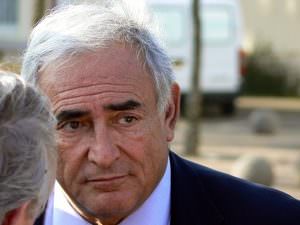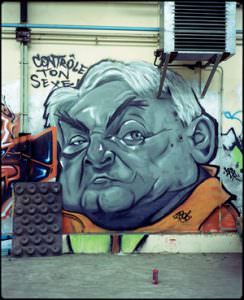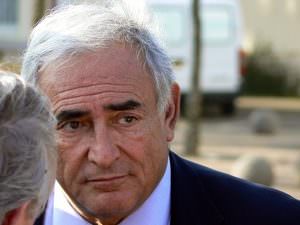Strauss-Kahn Scandal an Embarrassment for France
What can only seem the irresistible self-destruction of Dominique Strauss-Kahn has already produced fundamental and irreversible consequences in France and Europe.PARIS — What can only seem the irresistible self-destruction of Dominique Strauss-Kahn has already produced fundamental and irreversible consequences in French party-political affairs, in the presidential campaign that next spring will give France a new president or confirm the succession of the present one, and in the international negotiations now going on over national indebtedness inside the European euro zone.
It has been humiliating to France because of the prominence and reputation of Dominique Strauss-Kahn (DSK as he is generally called in France) as head of the International Monetary Fund, the leading presumed candidate for France’s presidency next year, and the sordid nature of the crimes he is alleged to have committed, which is lending weight to a traditional and derisory caricature of France as a nation and society, unserious and irresponsible.
The feelings expressed in the conventional man-and-woman-in-the-street interviews of French press and television include both anger and defensiveness concerning Strauss-Kahn himself, suspicions of entrapment by rivals and political conspirators, fury at the international treatment of the affair, and indeed popular shock at the IMF director’s treatment while undergoing the police and judicial procedures of New York City.
On that count, one can only reply to a French public largely addicted to American police-procedural television programs, and crime and justice dramas, that they ought to know the obvious. If one does not wish to be handcuffed by the police, held overnight in unpleasant conditions at a precinct house and suffer the notorious and humiliating “perp” (perpetrator) walk before dozens or hundreds of photographers and television cameras while being taken to an initial court appearance before a criminal court judge, don’t get involved in a sensational crime in New York City. The public spectacle is part of the public deterrent.
Perhaps Dominique Strauss-Kahn does not watch American television and realize that everybody gets the same treatment — ignoble drug-dealer, despicable wife-beater, Wall Street crook or celebrity crime-suspect. It’s just that the celebrities bring out the cameramen.
In France an affair such as this, at least until quite recently, would have been ignored by the media, hushed up by the police except in selective leaks in politically interested circles, yet eventually become “known” by everyone who gossips over Parisian dinner tables. The public would have been the last to know, if it ever knew. Only the kind of people who always know, knew.
One comment made on the spectacle provided by the treatment of DSK in the first days after his arrest was that it resembled how common-law prisoners were treated “under the ancien regime” — that is, before the revolution in France. France today is a republic, but a republican monarchy. That is one of the reasons Nicolas Sarkozy’s re-election to the presidency next year is in doubt. He lacks class. But so does DSK lack class, as he has demonstrated: He has not simply committed a crime but abdicated as a man. To do as he is said to have done bespeaks self-destruction. They do well to have a suicide watch on him at Rikers Island.
Some people always knew about him, people whose business it is to know and tell — the journalists. Not only every major politician in France knew about Strauss-Kahn but every journalist. Female journalists knew that they must never go alone to interview him. It was a joke — but not really a joke. At the IMF, there reportedly was a staff conspiracy to keep attractive women out of his entourage.
It was not a joke to Tristane Banon, the young Frenchwoman who says he attempted to rape her in 2002 when she was 23. She says she physically had to fight him off and was deterred from taking the case to the police only because her mother, prominent in the Socialist Party, said the two families were friends, the publicity would be atrocious and she surely didn’t want to spend the rest of her life known as Strauss-Kahn’s victim. The young woman actually did later describe the episode on a talk show, but the broadcasters bleeped Strauss-Kahn’s name, and nobody wanted to follow up. It was not a joke to “Ophelia” the chambermaid, who has fled her apartment, been provided a police guard and says her life has become a nightmare. The press in Paris now is publishing anguished self-examinations by journalists. Were they complicit in Ophelia’s ordeal?
The most distressing and perplexing element in this affair is Strauss-Kahn’s motivation. He was one of the most prominent and respected men in international public life. There was excellent reason to think that he could become president of France. Instead he made a choice he seemingly had often made before. He must have known where this choice eventually led. It led to the degradation of the perp walk and to the suicide watch at Rikers Island.
Visit William Pfaff’s website for more on his latest book, “The Irony of Manifest Destiny: The Tragedy of America’s Foreign Policy” (Walker & Co., $25), at www.williampfaff.com.
© 2011 Tribune Media Services, Inc.
Your support matters…Independent journalism is under threat and overshadowed by heavily funded mainstream media.
You can help level the playing field. Become a member.
Your tax-deductible contribution keeps us digging beneath the headlines to give you thought-provoking, investigative reporting and analysis that unearths what's really happening- without compromise.
Give today to support our courageous, independent journalists.






You need to be a supporter to comment.
There are currently no responses to this article.
Be the first to respond.